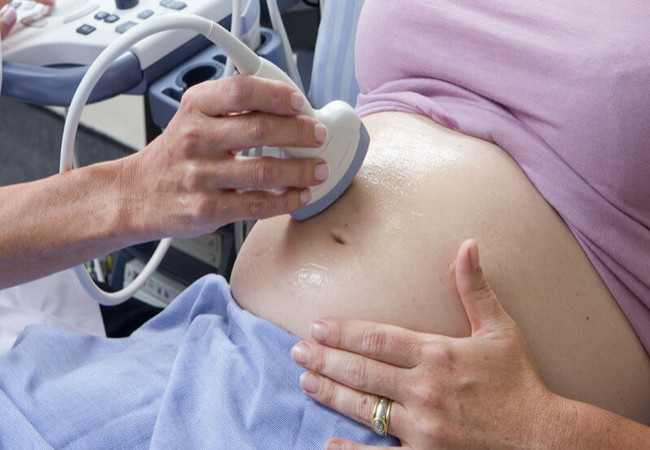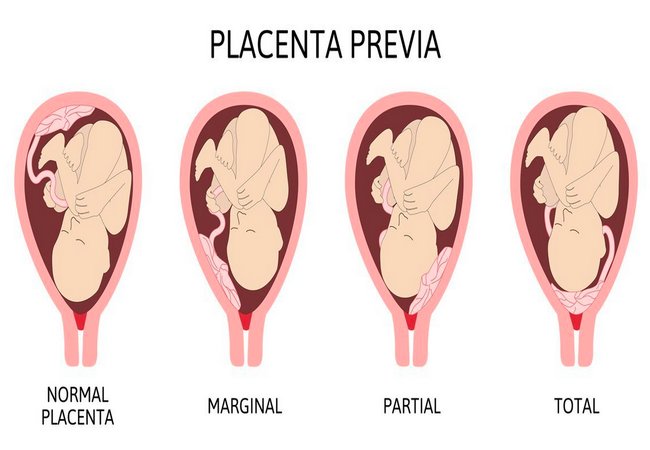Polyhydramnios Signs and Symptoms, Causes
What is Polyhydramnios?
An excess of liquor amni termed as polyhydramnios or hydramnios. It is arbitrarily defined as more than 2000 ml of liquor amni, because it becomes clinically obvious beyond this limit. Normal amniotic fluid volume is 500 -1500ml.

Polyhydramnios Symptoms and Signs:
Clinical Features of Polyhydramnios:
Symptoms of Polyhydramnios:
- Undue enlargement of the abdomen.
- Feeling of tense abdomen.
- Excessive movement of the fetus.
- Respiratory distress, palpitation, flatulence, dyspepsia.
- Edema, varicosities in legs.
Signs of Polyhydramnios:
It includes the following:
- Patient is dysphonic in lying position.
- Abdomen is hugely enlarged with tense shiny skin.
- Features of preeclampsia may present.
- Fundal height is more than the period of amenorrhoea.
- Girth of the abdomen at the level of umbilicus is more than 100 cm before term.
- Fluid thrill is present; ballottement of the fetus is easy.
- Fetal parts are not well defined.
- FHS is not distinct.
- Cervix is partially taken up or dilated.
Mild cases of polyhydramnios may not cause any noticeable signs in the mother. However, severe cases can lead to the following symptoms:
- Difficulty breathing unless standing or sitting in an upright position.
- Difficulty climbing stairs.
- Decreased urine production.
- Larger belly size for one’s gestational age.
- Swelling of the abdominal wall, vulva and legs.
- Excessive weight gain.
Polyhydramnios may be suspected by the doctor in case it seems difficult to assess the body contours and heartbeat of the baby despite an enlarged size of the uterus. Excessive amounts of amniotic fluid in the uterus tend to worsen certain pregnancy symptoms, such as:
- Indigestion,
- Constipation,
- Abdominal pain Heartburn Stretch marks,
- Varicose veins (when the valves within the veins stop working, causing the venous walls to become weak, leading to blood accumulation in the weak spots).
Causes of Polyhydramnios:
A. Fetal factors:
- Fetal malformation.
- Neural tube defects: anencephaly, open spina bifida.
- Esophageal or duodenal atresia.
- Hydrops fetalis.
- Chorioangioma of the placenta.
B. Maternal diseases:
- Diabetes mellitus.
-
Renal diseases, preeclampsia.
-
Cardiac diseases.
Diagnosis/Tests of Polyhydramnios:
All the diagnosis or tests of polyhydramnios have listed in the below:
a) Fetal Ultrasound,
b) Amniocentesis,
c) Glucose Challenge Test,
d) Karyotype,
e) Non-Stress Test,
f) Biophysical Profile (diagnostic procedure that combines the non-stress test with an ultrasound).
g) Doppler Ultrasound,
h) Fetal Echocardiogram,
i) Contraction Stress Test (assessing the baby’s heart rate with contraction of the uterus),
j) Blood Tests (for monitoring the mother’s diabetes levels).
More questions related to this article:
- Define polyhydramnios.
- What is polyhydramnios?
- What do you mean by polyhydramnios?
- What are the causes of polyhydramnios?
- Mention the Clinical features of polyhydramnios.
- Write down the Clinical features of polyhydramnios.
- What are the sign and symptoms of polyhydramnios?
- Mention the signs of polyhydramnios.
Mention the symptoms of polyhydramnios.











